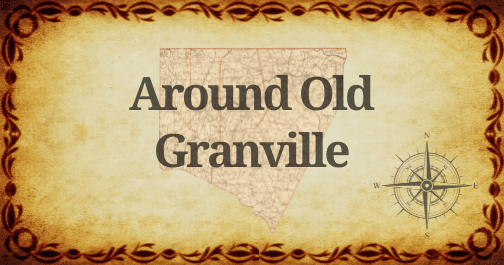Thomas Person of North Carolina has several things in common with George Washington, the first president of the United States of America: Both were generals in the Revolutionary War, both were surveyors, both were involved in politics of the day and both rose from humble beginnings to become wealthy landowners.
We only need look at a $1 bill to see an image of Washington gazing back.
But we don’t have any visuals to inform us as to what Person looked like – heck, historians aren’t even sure where he’s buried.
“Person kind of falls through the cracks, historically speaking,” said Mark Pace,
local historian and NC Room Specialist at Thornton Library in Oxford. But Person, he said, is one of the most significant – if not THE most significant – figures there is in the area known as Old Granville.
By the time he was 21, Person was surveying land for Lord Granville. “He had a reputation for not being a crook,” Pace told WIZS co-host Bill Harris on the Around Old Granville segment of TownTalk Thursday.
He used his job to his advantage, Pace said. By 1792, he owned 85,000 acres in North Carolina and Tennessee – roughly half the size of present-day Vance County.
He may have been the wealthiest man in Old Granville County, and he had 100 or more enslaved persons to work on the four expansive plantations that dotted his holdings.
But he also was a proponent of just government, Pace said. And not just for Granville County, but for the whole state.
This liberal ideology, coupled with the notion that persons of power and influence had an obligation to make their communities better places to live for everyone got Person in trouble from time to time with other wealthy people in positions of power.
One of those people was Richard Henderson, a member of the Colonial Assembly alongside Person.
“Richard Henderson brought some charges up against Thomas Person,” Pace said, formed a 79-person committee of fellow assembly men, and accused Person of “extortion, usury, perjury, purloining of tax money and levying illegal fees.” Henderson had more than 20 witnesses come in from all across the colony to testify, but after several days of testimonies, the claims were deemed baseless.
And that’s when the tables turned on Henderson – the committee made him pay for all the travel costs for those witnesses he’d called to testify against Person.
In 1770, Person found himself in jail in Hillsborough, awaiting trial for making treasonous comments. Gen. Tryon was on his way from New Bern for the trial, and that’s when Person hatched a plan.
Pace said Person desperately needed to get back to Goshen, his plantation located near present-day Berea in western Granville County, apparently to destroy some papers that contained some incriminating evidence.
After promising the jailer that he’d be back just as soon as he’d “taken care of some business,” Person raced to Goshen after supper and was, indeed, back the next morning. To seal the deal, the local preacher vouched for Person’s character.
Pace said Person’s desk – complete with axe marks made by Gov. Tryon’s men looking for the letters – is on display at UNC-CH’s Wilson Library.
“They never could get him on charges,” Pace said.
Although Person married, he and wife Jenna never had children, so there are no descendants. The plantation home at Goshen burned in 1932 and the recently restored Person’s Ordinary in Littleton is one structure that remains from Person’s holdings.
As settlers went westward from Granville County to claim frontier land, Person was honored by having a county named for him. Those names usually are made posthumously, but Person County got its name while the namesake was still alive.
CLICK PLAY!
